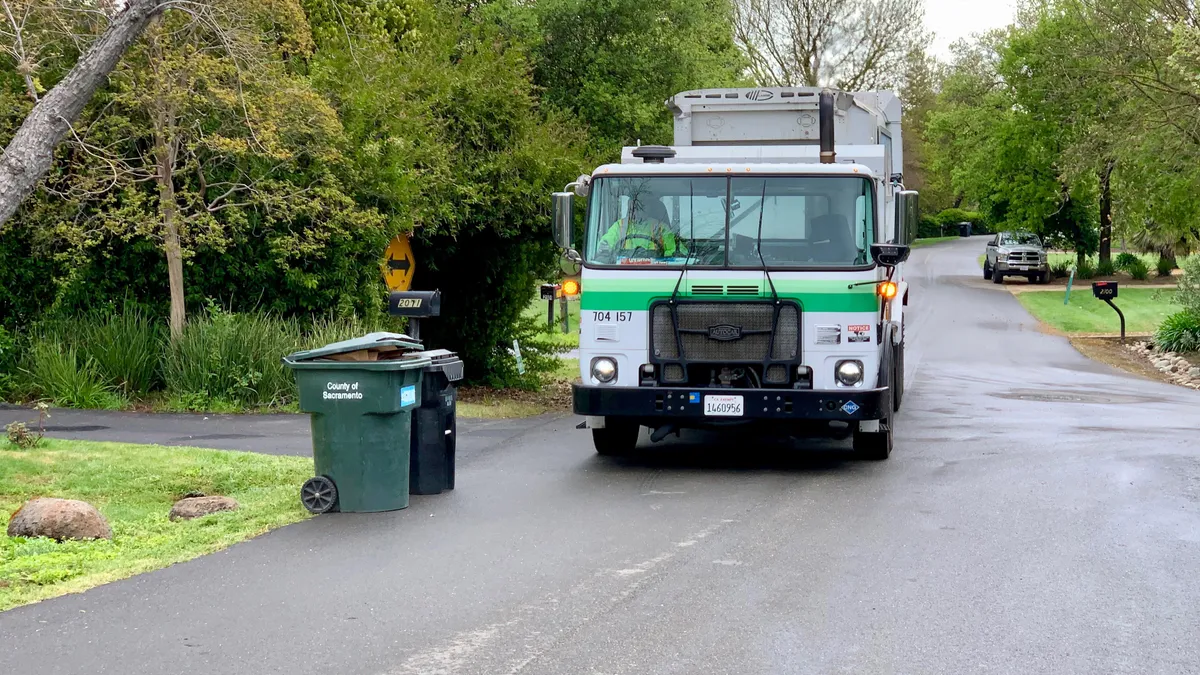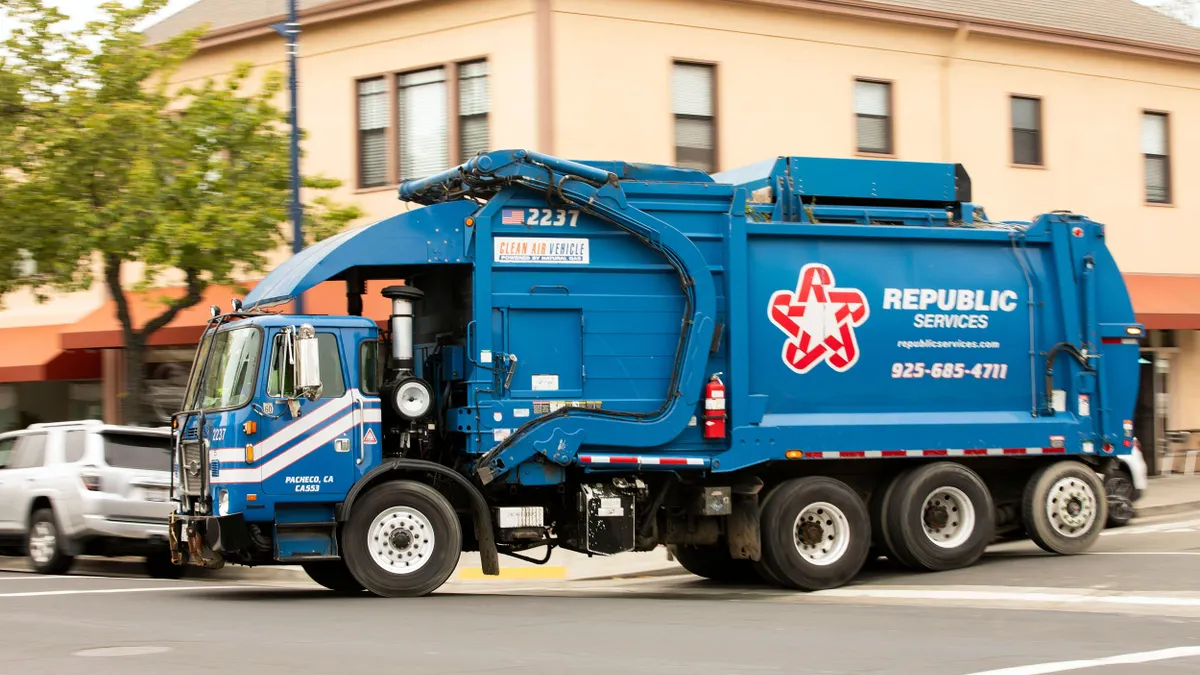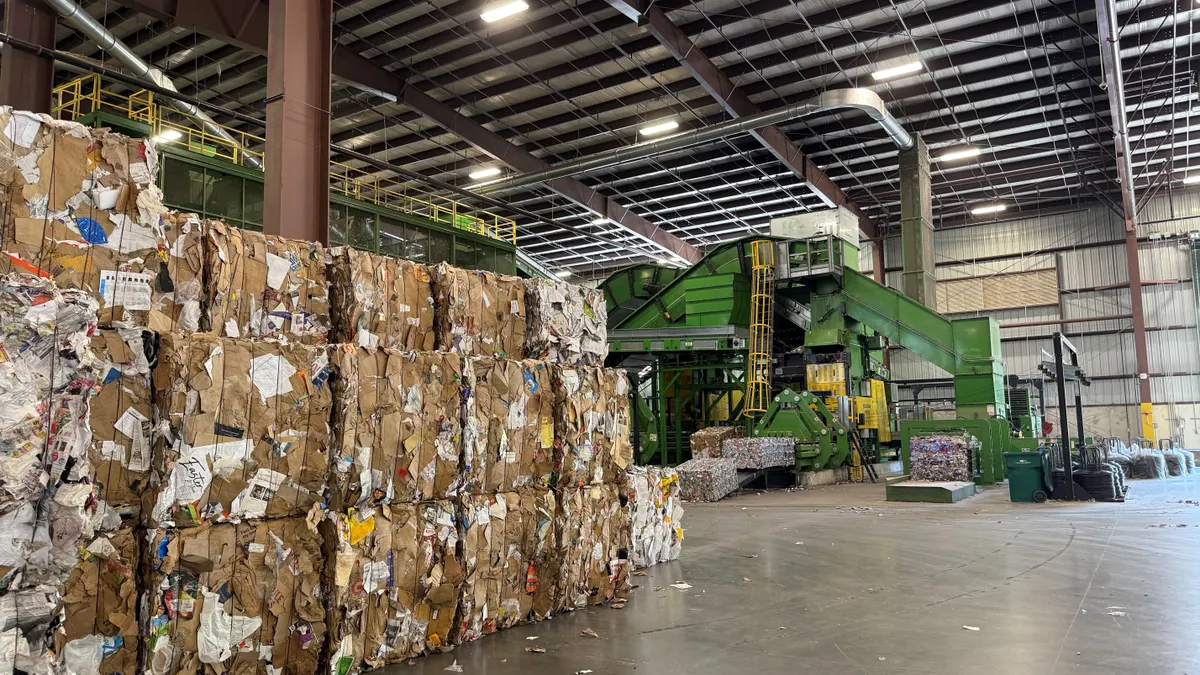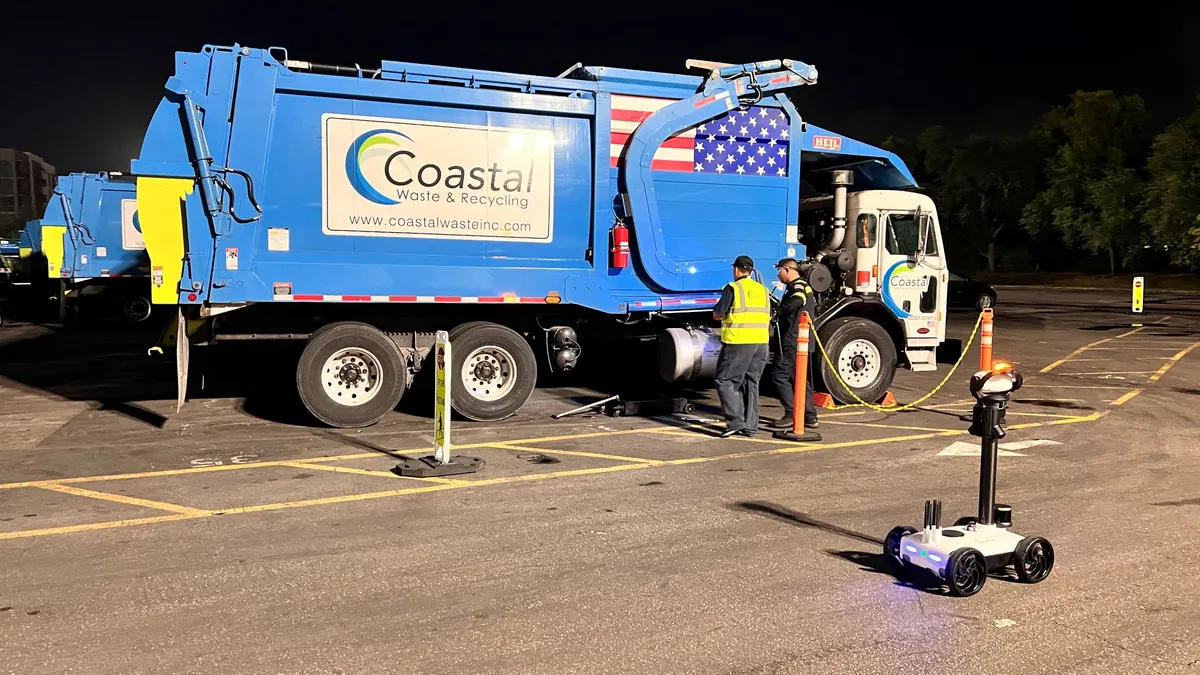Editor’s Note: Waste and recycling are inherently local issues in the United States, and we’re looking for new ways to highlight how these stories fit into broader trends. Send us your tips or feedback at waste.dive.editors@industrydive.com.
SWANA weighs in on current driver, helper employment challenges
The most recently shared U.S. jobs report revealed fewer than expected jobs filled in April. In the solid waste collection services sector, meanwhile, challenges continue in hiring and retaining drivers and helpers, says the Solid Waste Association of North America (SWANA). The organization reports that the longstanding challenge, driven in part by increasing competition from home delivery jobs, has grown during the COVID-19 pandemic.
Recent examples of disruptions stemming from the worker shortage include in Virginia Beach, Virginia, Columbia, South Carolina, and Flint, Michigan, where communities are dealing with delayed recycling pickup. In Flint, city crews have stepped in to help collect yard waste. SWANA specifically noted labor problems in Florida too. Locally-based hauler Waste Pro, for instance, in the past month has struggled to perform timely pickup service in Flagler County, according to local news sources.
SWANA put out a paper this week reporting that some public agencies have already tried to address the staffing troubles by leveraging overtime pay, premium pay, outside contractors, temporary staff hires, and temporary staffing agencies.
SWANA’s recommended short-term strategies include using more temporary workers and leveraging social media for more aggressive outreach to potential employees. Longer-term solutions include increasing compensation.
Additionally: “Communities that contract for waste and recycling collection services may have to renegotiate their contracts to reflect wage increases associated with driver and helper positions or reductions in service levels needed to minimize budget impacts.” That could also mean collection fee increases to cover costs.
Alternatively, if it remains difficult to hire helpers, SWANA said agencies and haulers may consider switching over to automated collection trucks, which it said can also improve worker safety. Trucks themselves have in some cases been part of the delayed collection issue, with Mobile, Alabama, saying this month that delivery of some trucks it ordered was delayed due to a global microchip shortage. The Mobile City Council this week approved the purchase of seven trucks, three of which are expected to be able to be delivered within the next week.
Women in Trucking President and CEO Ellen Voie has additional recommendations for outreach to potential drivers.
“I’ve always encouraged women to look at waste hauling careers, as they just don’t seem to picture themselves in this industry,” Voie said in an email. Waste employers may have more success recruiting women if they address pay equity and flexible work hours that allow for accommodating family commitments.
While there was talk around the jobs report’s release about women having an especially hard time going back to work due to child care constraints amid the pandemic, Voie said she hasn’t observed that trend among women drivers.
“I’ve seen the opposite occur,” she said, noting that the number of women applying for tuition assistance from the organization’s scholarship foundation to obtain their commercial driver’s license has gone up amid pandemic job losses. While many women in the industry are older and do not have young children, Voie said they’re also seeing younger women pursue CDLs. “This is promising.”
Major investment needed for U.S. recycling infrastructure, on the way in California
Demand for modernizing recycling infrastructure is on the rise and The Recycling Partnership now projects it would take nearly $17 billion over five years for all U.S. residents to have “recycling access that is equitable to their trash service.”
The nonprofit’s new “Paying It Forward” report outlines needs in collection programs, MRF infrastructure (375 upgraded facilities and 57 new ones), education campaigns and more. It notes how 40 million households still lack sufficient access, including an estimated 1 million people that recently lost access due to market- or pandemic-related program cuts.
Closing this gap would require expanding automatic curbside recycling access, but also notable increases in subscription service and extension to more multifamily properties. TRP estimates such a plan could boost the national recycling rate to 70%, deliver 169 million tons of new material and lead to a $30.8 billion economic benefit over 10 years. While the nonprofit touts notable results from its own funds over the years, it believes much more is necessary.
“To truly level up the system, that’s going to take decades to be able to get to the level of access we describe in this report,” said Dylan de Thomas, vice president of external affairs, about hitting such targets under current conditions. “To get to this level of access, it is impossible without policy."
TRP sees “big picture” state or federal solutions as key to addressing the current local patchwork. While some major companies and trade groups have recently evolved their stances on concepts such as extended producer responsibility, TRP’s report notes no policy outcome is assured and will need a range of funding sources.
Even if this nearly $17 billion investment came to fruition, that still wouldn't cover the significant rise in operating costs for local governments. Each community will need to make the choice that’s right for them, de Thomas said, but he encouraged prioritizing funding for education wherever possible. While the report recommends an ideal annual level of $10 per household, de Thomas said his group’s “Feet on the Street” campaigns deliver clear results for anywhere from roughly $2.50 to $4 per household and “incremental improvements in education are absolutely critical."
While resources vary around the country, at least one state is well-positioned for funding expansion. As part of its recently announced budget surplus, California is proposing $130 million in funding for edible food recovery, organics recycling and other recycling infrastructure needs. This includes creating an Office of Innovation in Market Development and Remanufacturing within CalRecycle to work with the Governor’s Office of Business and Economic Development.
Heidi Sanborn, chair of the state’s Commission on Recycling Markets and Curbside Recycling, views this as very positive news and believes it comes in response to recommendations made by the group in a recent report.
"This budget is huge and to me the thing I like the most is the money to support the development of infrastructure,” Sanborn said, noting she’s already seen new engagement from the governor’s office on these issues. “That's exactly what we've needed."
New York City moving forward on Clean Curbs
As states were beginning to shut down in March 2020, the New York City Department of Sanitation (DSNY) announced a “Clean Curbs” pilot program to address the piles of trash that crowd city sidewalks by deploying closed container designs to store waste. That issue of garbage bags in the streetscape — which attracts rodents, can spread litter, block pedestrian flow and is a general eyesore — remains a talking point for former DSNY Commissioner and mayoral candidate Kathryn Garcia.
The pandemic’s demands took precedence over the last year, but today DSNY is continuing to work with the Department of Transportation on that effort, which officials and collaborators discussed during a webinar this week hosted by architecture group AIA New York.
“In my mind, the biggest problem with this is not just that there's probably an 80-foot long pile of trash on the sidewalk, but that this is totally legal. And this is how we, the City of New York, for the last 50-plus years have encouraged buildings to set out their waste for collection,” said Gregory Anderson, DSNY deputy commissioner for policy and external affairs.
As “the amount of waste seems to continue to grow over time, particularly with COVID as more people are staying in their home, this is just a use of our public space that really is in conflict with all of the other great things that we're trying to achieve.”
The pilot program is currently accepting participation applications from business improvement districts, building owners, retail businesses and other private entities, Anderson said.
And Clean Curbs may dovetail with another forthcoming change: implementation of commercial waste zones, which will allow for up to three carters to operate in each of 20 zones throughout the city.
“We view the containerized waste proposal system as an extension of the creativity and forward thinking that DOT and DSNY have exhibited with things like commercial waste zones,” said David Segall, vice president of policy and municipalities at Recycle Track Systems, who is optimistic about the potential of those container designs to reduce contamination in recycling. Segall envisions a future in which containers may have sensors that could help people be “reminded or dinged or rewarded in some way for recycling in the right way.”
As DSNY and DOT assess which designs to implement, flexibility and modularity are key, said Peter Schon of the Center for Zero Waste Design.
“It's going to be hard to predict how waste streams will change and how use will change over time. So being able to adapt the system over time will be important,” as will having “mix and match” options based on whether a space has a higher volume of trash or organics.
More updates from around the country
-
Washington’s governor signed a law making it the second state with recycled content requirements for plastic beverage containers, the sixth to ban some form of expanded polystyrene products and the first to set comprehensive opt-in requirements for single-use foodware. Maryland’s governor signed a law to bolster recycling market development. (Waste Dive)
-
Denver advanced a bill requiring that businesses ask customers to opt-in for plastic utensils and related takeout items. Roanoke, Virginia, became the first in its state to pass a plastic bag fee ordinance. Albuquerque, New Mexico, is poised to reinstate its own plastic bag ordinance after an extended pandemic pause.
-
New York’s Department of Sanitation is debuting a new sculpture, “Forever Strongest,” to honor workers who died from COVID-19. The agency reports at least nine confirmed deaths and confirmed cases among 20% of its 9,500 employees.
-
Challenges continue for the Materials Innovation and Recycling Authority in Hartford, Connecticut, after plans to renovate its refuse-derived fuel facility were scrapped last year. Now, plans to potentially convert the site into a transfer station for long-distance export are encountering possible state permit challenges. (Hartford Courant)
-
In California, the San Luis Obispo County Board of Supervisors recently approved funding for a study about exiting the regional Integrated Waste Management Authority due to disputes over a 2019 polystyrene foam ban decision. (New Times)




















